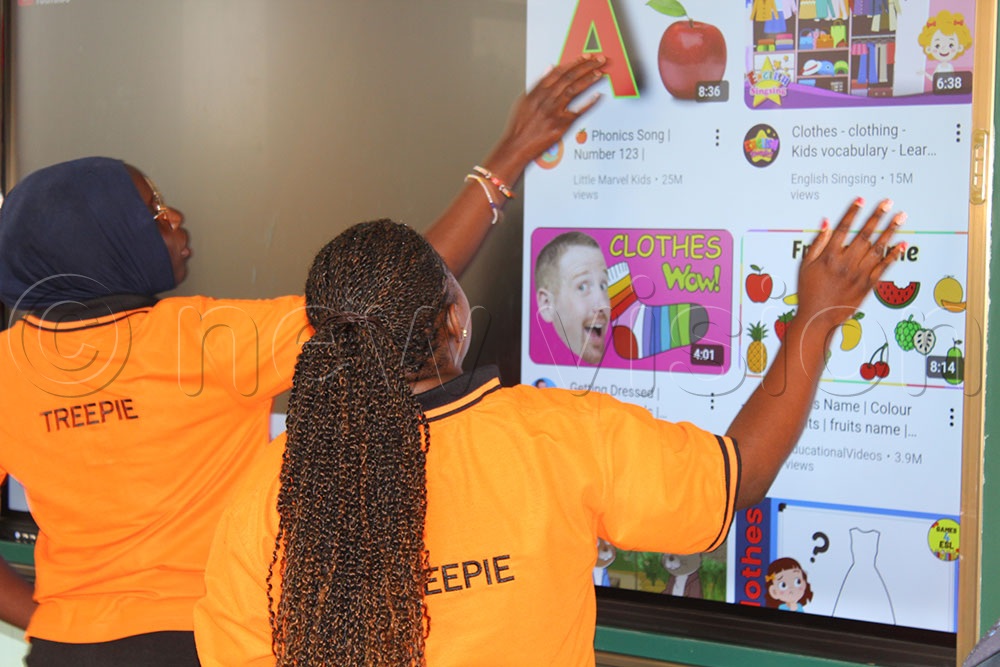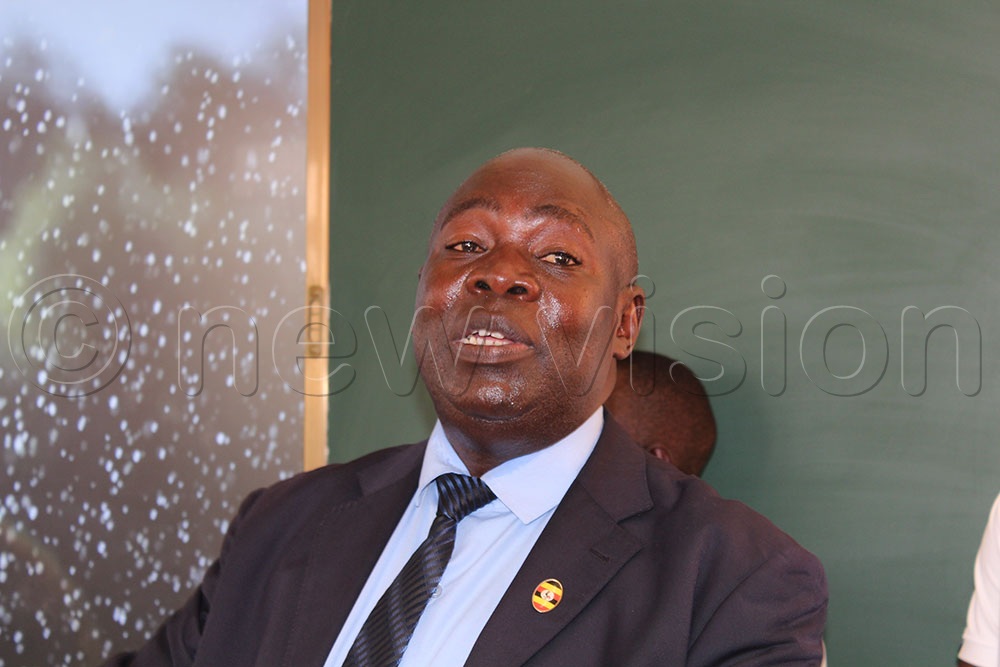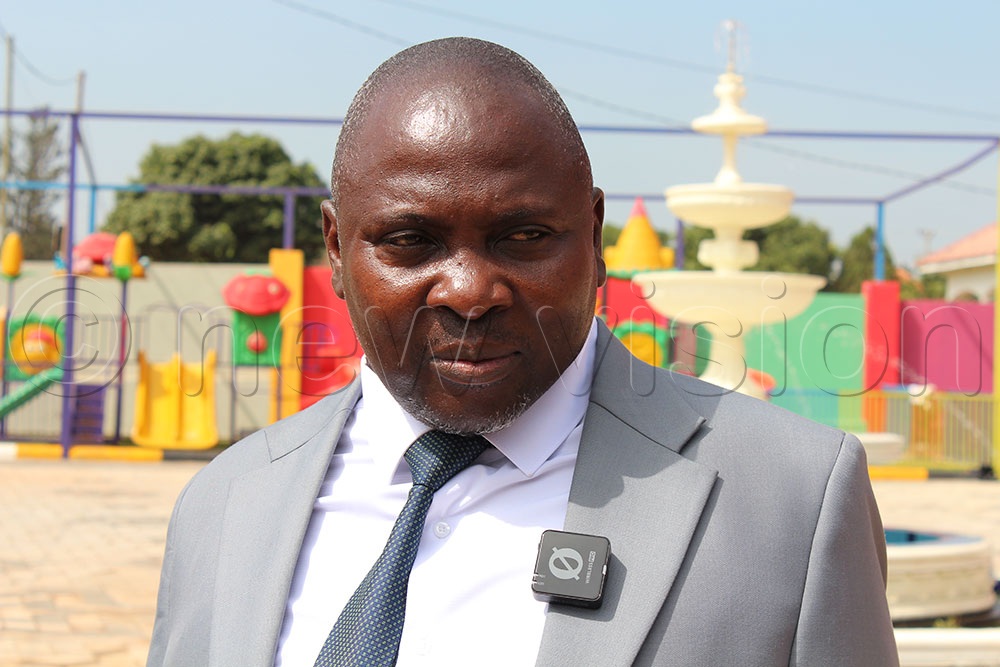'Interactive learning': Smart boards are the next big thing in Ugandan classrooms
We have seen the boards where a teacher can teach and children interact with what is being taught,” Kinobe said during a demonstration at Twinbrook.
A teacher at Twinbrook Schools instructs using one of the newly launched smart boards at the school, on November 6, 2025. (Credit: Bridget Ahurira)
Smart boards, an advanced form of interactive digital screens, could revolutionise classroom learning in Uganda by transforming how teachers deliver lessons and how pupils engage with content.
These displays allow teachers to project images, videos, and animations that make lessons more visual, participatory, and easy to understand.
In a fast-paced technological world, they are seen as fitting replacements for traditional chalkboards.
One school is setting the pace.
Twinbrook International School in Wakiso district made history on Thursday (November 6) by becoming a fully digitalized primary school, following the installation of smart boards across all its classrooms — from kindergarten to Primary Seven.
Each board functions like a touchscreen computer, enabling learners to interact directly with content — from identifying animals and exploring the human body to observing scientific concepts in real time.
Beyond simplifying the teacher’s workload, smart boards enhance learners’ concentration and curiosity. (Credit: Bridget Ahurira)
New approach
According to Fredrick Kiyingi Kinobe, the retired district education officer for Wakiso, the use of smart boards represents a major step forward for the country’s education system.
“We have seen the boards where a teacher can teach and children interact with what is being taught,” Kinobe said during a demonstration at Twinbrook.
“The children look at the motion pictures and remain attentive. It makes learning more interesting.”
The feeling is that smart boards eliminate the traditional need for physical teaching aids, such as fruits, charts, or classroom nature tables, making lessons cleaner, faster, and easier to prepare.
“In the past, teachers had to look for items like matooke, chicken, or mangoes to illustrate lessons. But now everything is displayed on the board,” said Kinobe.
Beyond simplifying the teacher’s workload, the technology enhances learners’ concentration and curiosity.
Learners perceive the smart boards as televisions, which keeps them alert and eager to learn throughout lessons.

Retired Wakiso DEO Fredrick Kiyingi Kinobe says the use of smart boards represents a major step forward for Uganda’s education system. (Credit: Bridget Ahurira)
'Continuous training'
However, Kinobe cautioned that the sustainability of the initiative depends on addressing challenges such as unreliable power supply, the high cost of equipment, and teachers’ limited ICT skills.
“We need continuous professional development to help teachers embrace this technology. The issue of power and internet also needs government support," he said.
Twinbrook Schools director Jaffer Senganda said the innovation is designed to make learning less abstract and more experiential.
“Our learning has been mostly theoretical, but with smart boards, learners can visualise everything they are taught. They can explore zoos, national parks, or even the human heart right from their classroom," he said.
According to Senganda, the smart boards enable learners to continue studying virtually from home. Lessons can be streamed live, while the boards can conduct automated sessions in the absence of a teacher.
“Education should not stop because a teacher is away. “With smart boards, lessons can continue, and students can even access content from home.”

Twinbrook Schools director Jaffer Senganda says smart boards are designed to make learning less abstract and more experiential. (Credit: Bridget Ahurira)
Despite the high costs associated with importing the gadgets, maintaining internet access, and ensuring stable power, Senganda believes the investment is worthwhile.
“Education is a service, not a business,” he said. “If government could exempt taxes on such technology and subsidize internet costs, more schools would adopt it.”
The school's headteacher, Lilian Bukenya, said the innovation is reshaping both teaching and classroom culture.
“We are conducting in-house training during terms and holidays to ensure teachers are confident using the boards. Technology is here to stay, and we want to prepare our learners for the world they are growing into," she said.
Nonetheless theirs is a blended approach.
“Smart boards make learning interactive, but we still allow pupils to touch, create, and experiment with real materials,” said Bukenya.
As Uganda moves steadily toward digital transformation in education, smart boards are expected to become a key driver of interactive learning and creativity in classrooms, bridging the gap between theory and practical, and positioning learners for a more technology-driven future.